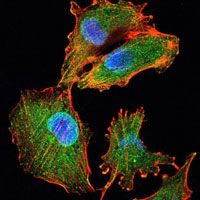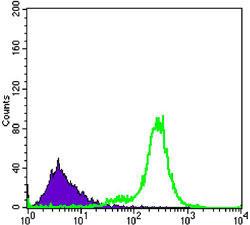IL34 Antibody
Purified Mouse Monoclonal Antibody
- SPECIFICATION
- CITATIONS
- PROTOCOLS
- BACKGROUND

Application
| WB, FC, ICC, E |
|---|---|
| Primary Accession | Q6ZMJ4 |
| Reactivity | Human |
| Host | Mouse |
| Clonality | Monoclonal |
| Clone Names | 1D12 |
| Isotype | IgG1 |
| Calculated MW | 27.5kDa |
| Description | Cytokine that promotes the differentiation and viability of monocytes and macrophages. Stimulates phosphorylation of MAPK1/ERK2 AND MAPK3/ERK1. Ligand for colony-stimulating factor-1 receptor CSF1R.Tissue specificity: Detected in the sinusoidal epithelium in the red pulp of spleen (at protein level). Predominantly expressed in spleen. Also detected in a range of other tissues including heart, brain, lung, liver, kidney, thymus, testis, ovary, small intestine, prostate and colon. |
| Immunogen | Purified recombinant fragment of human IL34 expressed in E. Coli. |
| Formulation | Ascitic fluid containing 0.03% sodium azide. |
| Gene ID | 146433 |
|---|---|
| Other Names | Interleukin-34, IL-34, IL34, C16orf77 |
| Dilution | WB~~1/500 - 1/2000 FC~~1/200 - 1/400 ICC~~N/A E~~N/A |
| Storage | Maintain refrigerated at 2-8°C for up to 6 months. For long term storage store at -20°C in small aliquots to prevent freeze-thaw cycles. |
| Precautions | IL34 Antibody is for research use only and not for use in diagnostic or therapeutic procedures. |
| Name | IL34 |
|---|---|
| Synonyms | C16orf77 |
| Function | Cytokine that promotes the proliferation, survival and differentiation of monocytes and macrophages. Promotes the release of pro-inflammatory chemokines, and thereby plays an important role in innate immunity and in inflammatory processes. Plays an important role in the regulation of osteoclast proliferation and differentiation, and in the regulation of bone resorption. Signaling via CSF1R and its downstream effectors stimulates phosphorylation of MAPK1/ERK2 AND MAPK3/ERK1. |
| Cellular Location | Secreted. |
| Tissue Location | Detected in the sinusoidal epithelium in the red pulp of spleen (at protein level). Predominantly expressed in spleen Also detected in a range of other tissues including heart, brain, lung, liver, kidney, thymus, testis, ovary, small intestine, prostate and colon. |

Thousands of laboratories across the world have published research that depended on the performance of antibodies from Abcepta to advance their research. Check out links to articles that cite our products in major peer-reviewed journals, organized by research category.
info@abcepta.com, and receive a free "I Love Antibodies" mug.
Provided below are standard protocols that you may find useful for product applications.
References
1. Strausberg RL, et al. Proc Natl Acad Sci U S A, 2002 Dec 24. 2. Lim J, et al. Cell, 2006 May 19. 3. Lin H, et al. Science, 2008 May 9.
If you have used an Abcepta product and would like to share how it has performed, please click on the "Submit Review" button and provide the requested information. Our staff will examine and post your review and contact you if needed.
If you have any additional inquiries please email technical services at tech@abcepta.com.













 Foundational characteristics of cancer include proliferation, angiogenesis, migration, evasion of apoptosis, and cellular immortality. Find key markers for these cellular processes and antibodies to detect them.
Foundational characteristics of cancer include proliferation, angiogenesis, migration, evasion of apoptosis, and cellular immortality. Find key markers for these cellular processes and antibodies to detect them. The SUMOplot™ Analysis Program predicts and scores sumoylation sites in your protein. SUMOylation is a post-translational modification involved in various cellular processes, such as nuclear-cytosolic transport, transcriptional regulation, apoptosis, protein stability, response to stress, and progression through the cell cycle.
The SUMOplot™ Analysis Program predicts and scores sumoylation sites in your protein. SUMOylation is a post-translational modification involved in various cellular processes, such as nuclear-cytosolic transport, transcriptional regulation, apoptosis, protein stability, response to stress, and progression through the cell cycle. The Autophagy Receptor Motif Plotter predicts and scores autophagy receptor binding sites in your protein. Identifying proteins connected to this pathway is critical to understanding the role of autophagy in physiological as well as pathological processes such as development, differentiation, neurodegenerative diseases, stress, infection, and cancer.
The Autophagy Receptor Motif Plotter predicts and scores autophagy receptor binding sites in your protein. Identifying proteins connected to this pathway is critical to understanding the role of autophagy in physiological as well as pathological processes such as development, differentiation, neurodegenerative diseases, stress, infection, and cancer.




